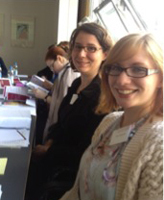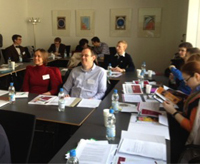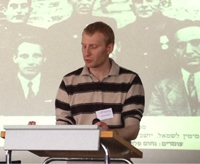
Graduate students in Notre Dame’s Department of History are making invaluable connections with German and Russian scholars as part of a graduate-student workshop now in its third year.
The annual meeting provides a forum for beginning and advanced doctoral students to present papers and receive feedback from faculty and students at other universities around the world.
In the process, participants cultivate an international, interdisciplinary network of peers that strengthens and broadens their studies—and offers opportunities for publishing and funding their work, says organizer Semion Lyandres, associate professor in the Department of History and co-director of the Russian and East European Studies program in Notre Dame’s College of Arts and Letters.
Scholarly Connections

This May, the theme of the workshop was Culture, Society, and Memory: The Challenges of Historical and Sociological Research on Russia, Germany, and America. The meeting was held in Bielefeld, Germany, where six Notre Dame graduate students and one post-doctoral fellow met with about a dozen peers from Bielefeld University, European University in St. Petersburg, and St. Petersburg State University. Patrick Griffin, Madden-Hennebry Professor and chair of Notre Dame’s Department of History, also participated.
“It is important to internationalize our program and expose students to different systems of education, especially such an important graduate program as Bielefeld, with its worldwide reputation for combining history and sociology,” Lyandres says. “This is something we don’t emphasize as much at Notre Dame, where we are very strong in religious, intellectual, and political history.”
After the gathering, the students from Notre Dame compiled a report highlighting the various ways each had benefited.
First-year graduate student Monica Bykowski, for example, made the acquaintance of an associate professor of history at Bielefeld who has since shared his own work with her and expressed interest in serving on her dissertation committee.
Maria Rogacheva, who is in the final stages of writing her dissertation, was invited to an annual graduate student conference and met with a renowned scholar on Russian and Soviet studies, who also offered feedback on her dissertation.
Idea Exchange

“What I enjoyed most was the opportunity to read and comment on papers from other disciplines and to receive feedback from sociologists on my own work,” says Martina Cucchiara, a recent Ph.D. graduate.
“In any academic discipline, there is a danger of ‘academic provincialism.’ We rarely communicate with people from other disciplines and don't seek out their methods,” she says. “It was also great to receive comments from professors from another university who are not on one's dissertation committee.”
Mike Westrate, who has helped organize the event each year and is now in the final stages of his dissertation, says he strengthened important connections with scholars that he had met in previous workshops. He was also invited, along with first-year student Taras Karaulshchikov, to have coffee in a senior German scholar’s home, where they were able to converse and gain new insights that would not have been possible in another setting.
The Department of History plans to host the workshop on the Notre Dame campus in April 2013, with the goal of expanding participation to students studying other areas of history, Lyandres says. The first three workshops were funded by the University’s Nanovic Institute for European Studies and Kellogg Institute for International Studies, as well as the College’s Institute for Scholarship in the Liberal Arts.
“This workshop is a hugely important introduction for our students to other intellectual approaches, and it will serve them well in their careers as they forge ties with the best graduate students in history and sociology,” he says. “It also helps to promote Notre Dame—to show who we are and what we do well.”
Learn More >
- Department of History graduate program
- Semion Lyandres faculty page
- Related story on Maria Rogacheva’s research
- Nanovic Institute for European Studies
- Kellogg Institute for International Studies
- Institute for Scholarship in the Liberal Arts